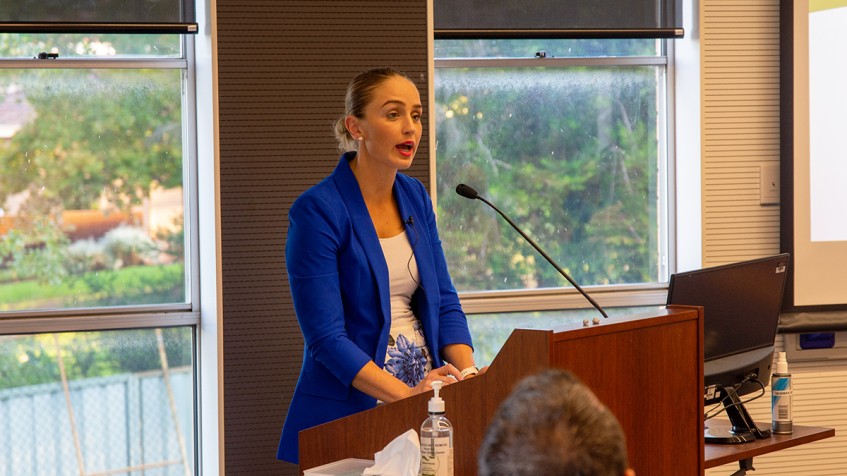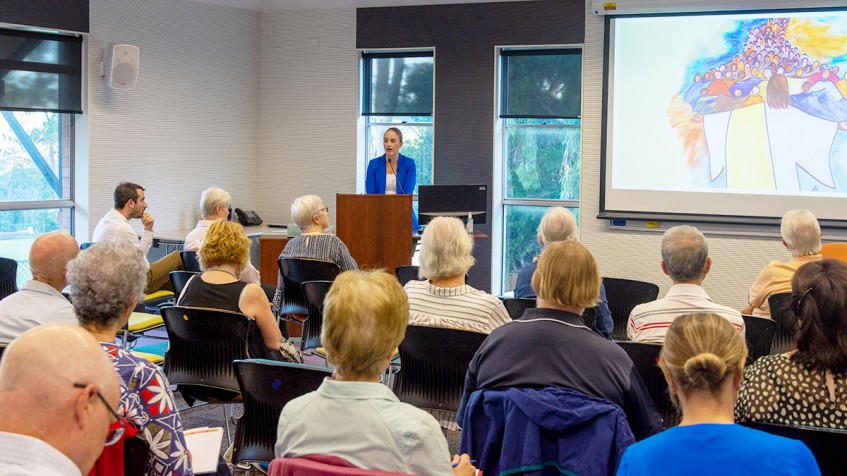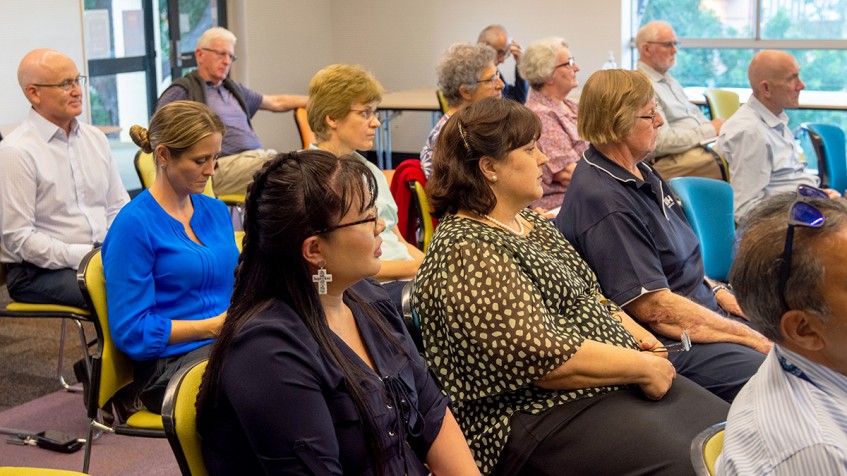News & Events
-
Latest News
- World Youth Day Cross and Icon to inspire youth at the Australian Catholic Youth Festival
- Call to support the Peter’s Pence appeal in 2025
- Bishops release new evangelisation resource
- Conference President, VP attend Papal Inauguration Mass
- Bishops welcome Youth Festival as opportunity for growth in faith
- Archive
- The Record Magazine
- Events
- Photo Gallery
- Video Gallery
Perth educator unpacks objective of being a ‘Humble, Healing, and Merciful’ Church pre-Plenary
By Matthew Lau
A Perth lay Plenary Council Member (formerly referred to as Delegate) has last month unearthed what it means to be a humble, healing, and merciful Church in lead-up to the first assembly this October.
In December 2020, Archbishop Timothy Costelloe SDB named Gemma Thomson, Iona Presentation College’s Dean of Mission and Catholic Identity, among the 15 additional nationwide Members for the Church of Australia’s Fifth Plenary Council.
Ms Thomson is also a member of the Perth Archdiocese’s Plenary Council Strategy and Engagement Group, a member of the Perth Archdiocese’s Vocations Committee, a member of the Perth Archdiocese’s Centre for Faith Enrichment Committee of Management and is the Justice Contact for the Presentation Sisters of Western Australia.
Based on the six Thematic Discernment Papers, a series of local Plenary talks have been conducted ahead of the now multi-modal approach for the first assembly, which will be held from 3 to 10 October 2021.

Gemma Thomson, Plenary Council 2021 lay delegate for the Catholic Archdiocese of Perth, gives a presentation titled “Towards Plenary 2021 – Discovering a Christ-centred Church that is Humble, Healing and Merciful” 25 March. Photo: Matthew Lau.
This latest presentation, titled “Towards Plenary 2021 – Discovering a Christ-centred Church that is Humble, Healing and Merciful”, was hosted by the Centre for Faith Enrichment on 25 March at Newman Siena Centre.
Ms Thomson spoke in detail about the behaviours a mission-focussed Catholic Church should encompass if it is to move forward in a humble, healing, and merciful manner.
The Thematic Paper on this topic cites how this shift is “a cry from deep within the heart of the people of God”, to which Ms Thomson explained has been a call that has been building for some time.
“In light of recent events and the evolution of technology, the call has been brought to the forefront of the Plenary Council encounter and is very much a reality of the signs of the times in which we find ourselves,” she elaborated.
The paper's theme encompasses much of the pain experienced in the body of the Church in Australia, providing the analogy of “pain has many faces” that resonates with Ms Thomson because it gives pain a human element.
“Sitting uncomfortably in a place of pain is not what we would ever opt to do willingly, but instead, it is something that we are called to do to move forward.
“Healing cannot occur if we are not willing to acknowledge, accept and work together in the hope that a new Church can emerge from these current times,” she added.
“The reality of the Paschal Mystery demonstrates to us that whilst there are large amounts of trauma, loss and grief that have occurred or are occurring in the Church, the promise of hope and redemption is very much available to us and offer a renewed reality if we work individually and collectively towards re-orientating our Christ-centred Church on the missio dei [mission].”
The paper suggests that the answer to “What is the Holy Spirit saying to the Church in Australia?” might be most clearly heard when we connect with the pain in our midst, stand with the people who are hurting, and bend our ear to listen to their stories.
“We cannot underestimate the power of the human connection, and we cannot underestimate the importance of ‘being present’ to others. Otherwise, we can unwittingly become disconnected with those who may be suffering,” she commented.
“We can often fall into the trap of ‘hearing’ others as we go about our busy lives and can often ‘trip up’ when it comes to deep listening unless we are intentional about carving out time to listen to those who are hurting.
“If we are to achieve Pope Francis’ vision of the Church as a caravan of solidarity, we must work towards removing the physical and metaphorical barriers obstructing the least, the last and the lost from experiencing God’s mercy.”
Ms Thomson then highlighted how it would be beneficial for the Church in Australia to discern every attitude, discussion, re-orientation, and future planning through the questions: “Is this healing? Is this humble? Is this merciful?”.
“This notion of re-orientation is not an easy one, but a necessary one and by asking ourselves these three questions, we begin to preach the Gospel more fully as we consider how our actions and words reflect the mission of Christ and how subsequently, these actions and words impact those around us.

Gemma Thomson, Plenary Council 2021 lay delegate for the Catholic Archdiocese of Perth, gives a presentation titled “Towards Plenary 2021 – Discovering a Christ-centred Church that is Humble, Healing and Merciful” 25 March. Photo: Matthew Lau.
“We will need to engage meaningfully in the art of accompaniment, being a Church that walks together, walking at a steady and reassuring pace. This may be different to what we are used to, and that’s okay – a revolution of tenderness beckons.”
The call to action, she added, is a strong, relevant, and necessary aspiration.
“[We are called] to be like Jesus – the humble man from Galilee, the healer who touched the wounded and the one who reveals the merciful heart of God the Father to the world.”
“If our Church is to be more humble, healing and merciful, we must take inspiration from the person and lived experience of Jesus Christ outlined in the Scriptures.
“We must make Jesus real for those whom we meet, and be cognisant that we “are the face of Jesus” for many people; the importance of how we speak, act and treat others cannot be undervalued.”
In conclusion, Ms Thomson stated that the Church’s challenge to be more humble, healing, and merciful is “to meet those in pain, to engage in authentic dialogue, listen openly and deeply, and hear the voice of Christ in the stories we are the audience to”.
“Whilst my address has focussed mainly on people, the delicate ecology of our common home is also suffering, and we must take proactive steps to care with the same rigour for God’s creation.
“That said, there is tremendous recognition of the good work and goodwill evident in our Church community that we can be very proud of, in particular in education, health services, foreign aid and aged care,” she reflected.
“Great courage, boldness and grace are required at this time to re-orientate the Church.”

Several attendees listened observantly to Gemma Thomson’s Plenary talk on Thursday, 25 March at Newman Siena Centre. Photo: Matthew Lau.
After the 25 March event, Ms Thomson told The eRecord that the feedback from attendees was very positive as those in attendance valued her authenticity, the personal element integrated into the thought-provoking topics presented and the opportunity to hear the perspective of a young, lay, faith-filled woman.
Access the six Thematic Discernment Papers here: plenarycouncil.catholic.org.au/continuing-the-journey-of-discernment
